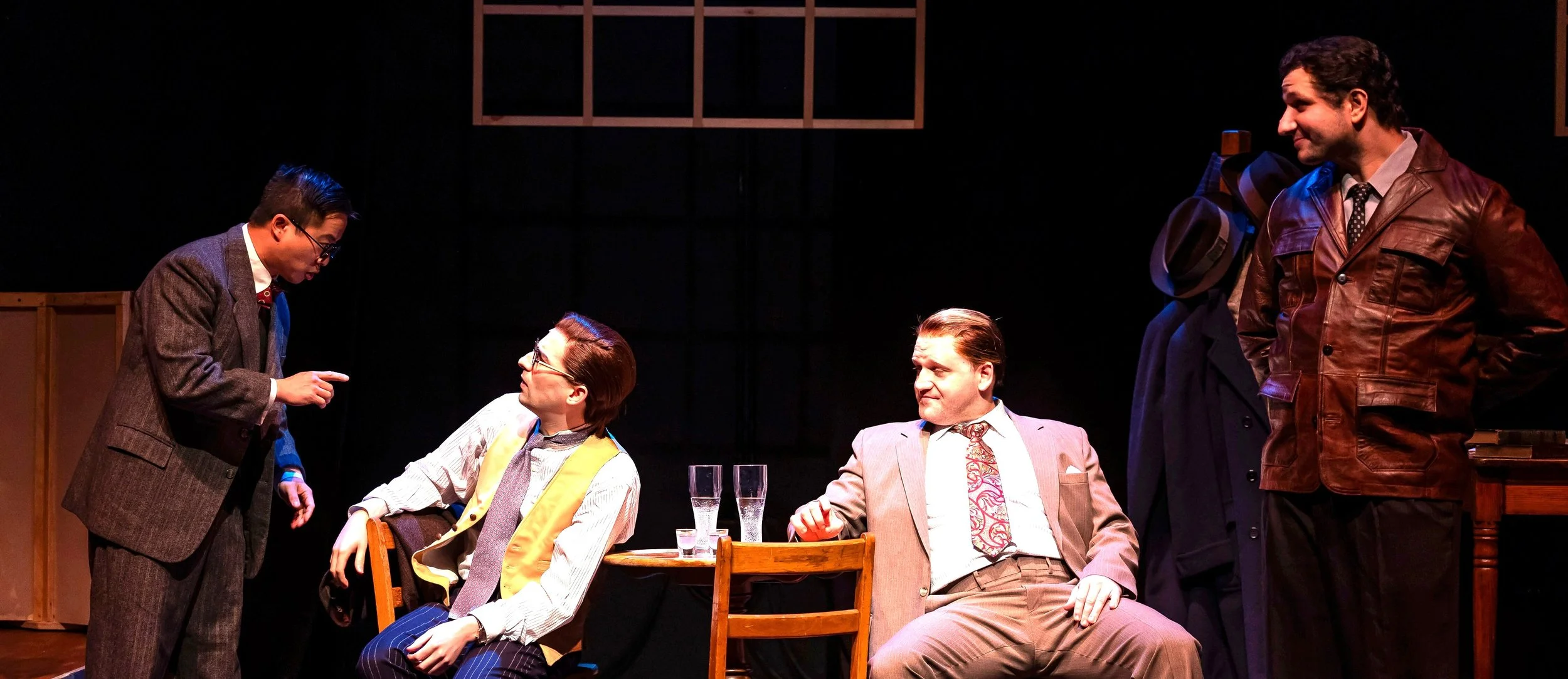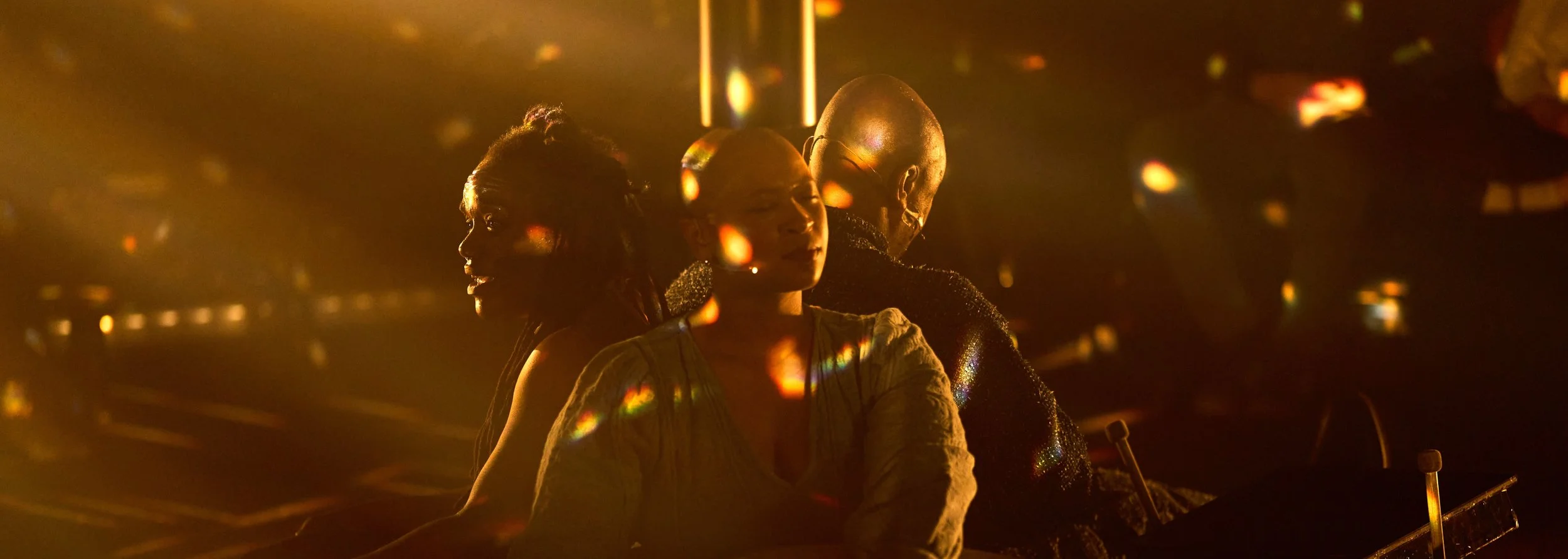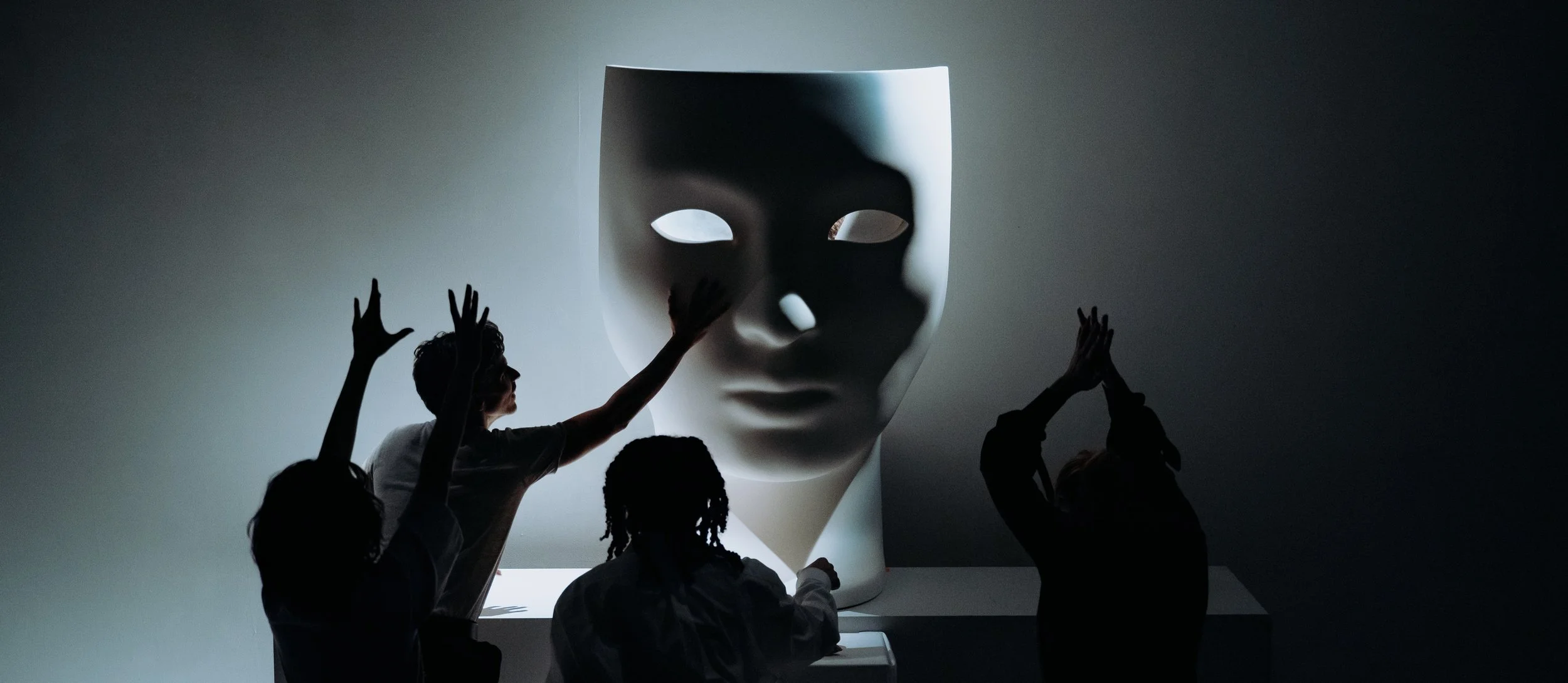Dream Feed, currently at HERE, is a poetic meditation on the theme of dreams. Performed by the two-time Grammy Award–winning theatrical family band the HawtPlates (Jade Hicks, Justin Hicks, and Kenita Miller-Hicks), the production utilizes sound and song to bring subconscious ideas to the surface.
Wake
Grief is very personal, and everyone processes it in their own way and in their own time. Elisabeth Kübler-Ross identified five stages of grief: denial, anger, bargaining, depression, and acceptance. Wake, written by Leon Ingulsbrud and Brooke Shilling, explores the contours of these stages through music, dialogue, musings, reflections, and poetry.
Amaze
Anyone searching for a rabbit-out-of-hat show in which a master magician saws a femme fatale in half or makes her disappear should look elsewhere than Jamie Allan’s Amaze. Allan’s show has some dazzling glitter and glitz, but underneath it all there is a moving story that director Jonathan Goodwin has deftly and incrementally integrated with Allan’s sleight-of-hand illusions and interactions with his audience.
Radio Downtown: Radical ’70s Artists Live on Air
Creative teams that turn popular movies into musicals are becoming commonplace on Broadway, but as Radio Downtown: Radical '70s Artists Live on Air demonstrates, it takes a rare breed of creator to unearth a collection of decades-old public radio interviews and transform them into a viable piece of Off-Broadway theater. Fortunately, Steve Cosson is just such a visionary.
The Meeting: The Interpreter
Considering it has a cast of two, The Meeting: The Interpreter is a very busy production. The actors, Frank Wood and Kelley Curran, move all over the stage—standing here, kneeling there, spinning around in wheeled chairs, dancing a little—and Curran, who plays multiple characters, repeatedly switches her costume or wig. Video, puppets, sound effects and a slew of props are also part of the action.
Dark Noon
Dark Noon, the South African-devised history of the American West now visiting Brooklyn from the Edinburgh Festival, foregrounds violence by white Europeans against blacks, Asians, and native Americans to debunk the mythology of America established by heroes in film westerns. The title deliberately references High Noon (1952), but the piece belongs to the “in yer face” school of theater, established in Britain in the 1990s. Although “slapstick humor” is billed as one element of the production, the send-up is a heavy-handed attack on the depredations of Manifest Destiny.
Here There Are Blueberries
Here There Are Blueberries, a 2024 Pulitzer Prize finalist by Moisés Kaufman and Amanda Gronich, explores the idea that a picture can speak a thousand words. The play has been created using “historical artifact, interviews conducted with real people, historical transcripts, and other primary sources.” Centered on an album of photos that was meant to be destroyed, the play asks whether the side of those who commit atrocities in history should also be shown.
Corruption
American playwright J. T. Rogers, the author of Oslo, tackles political issues again in Corruption. At first glance, the play’s subject matter looks parochial: the phone-hacking scandal in London in 2010 and 2011. That scandal, in which newspapers belonging to Australian media tycoon Rupert Murdoch were found to have hacked private phones as well as those of public officials, engulfed newspapers, prime ministers, investigative reporters, and members of Parliament. In Bartlett Sher’s thrilling production, the immersion into British politics comes with numerous parallels to American politics.
Maiden Voyage
In spite of the progress that women have made over the years when it comes to achieving gender equality, Cayenne Douglass’s new play, Maiden Voyage, shows that women need to stop overcompensating and simply act authentically in their workplace. Directed by Alex Keegan, and coinciding with Women’s History Month, this drama takes one five fathoms deep into the ocean and a distaff Navy world.
Remember This Trick
Antisemitism, as “the world’s oldest hatred,” appears to defy time limits. It may cloak itself in the cultural norms of a particular society, but similar tropes, accusations, and treatises, sometimes tweaked, resurface in different locations. Remember This Trick, deftly directed by David Herskovits, who also doubles as sound designer, is a collaborative, thoroughly engaging exploration of antisemitism across millennia, and the resilience and survival of those who experience it.
Get Your Ass in the Water and Swim Like Me
The Wooster Group’s 2017 celebrated production of The B-Side: “Negro Folklore From Texas State Prisons” was promoted as a “record album interpretation.” Conceived by Eric Berryman, the multimedia performance gave thrilling urgency and pulsing vitality to a recording from 1965 that featured African American work songs, spirituals, and personal anecdotes from prison. Berryman and The Wooster Group’s current piece is an exploration of Get Your Ass in the Water and Swim Like Me: Narrative Poetry from Black Oral Tradition, an LP that was released by Rounder Records in 1976. While the performance has its share of exhilarating moments, Get Your Ass in the Water and Swim Like Me is not as stirring as the previous work. It has, regrettably, several of the hallmarks of what is described in the recording industry as “difficult second album syndrome.”
Amid Falling Walls
It may seem contradictory—perhaps even cavalier and disrespectful—to create a musical about deprivation and brutality in the ghettos when European Jewry’s destruction was at its height. Yet despite the death and disease under German occupation, the arts, particularly music, flourished. Writer and librettist Avram Mlotek, who curated songs from those dark days in Amid Falling Walls (in Yiddish Tsvishn Falndike Vent) has showcased just that. His co-curator and father, musical director Zalman Mlotek, and director Matthew “Motl” Didner, have enabled both Yiddish and non-Yiddish speaking audiences to share in an immersive experience. English-speaking audiences can share this experience via supertitles, projected above and at the periphery of the stage.
Monsieur Chopin
Hershey Felder, the pianist and actor who has embodied musicians such as George Gershwin and Ludwig van Beethoven in previous shows, is Fryderyk Chopin in his latest stage biography, Monsieur Chopin, directed by Joel Zwick. In the script he has written, Felder climbs into the skin of Chopin, and reveals both the highs and lows of the 19th-century Polish pianist-composer’s life and career.
Emergence
Things are not as they seem,” intones Patrick Olson, the creator and driving force behind Emergence, an uncanny conceptual performance that merges art, science, music, and monologue and may well be the most original Off-Broadway show this season. Accompanied by an ensemble of four singers, three dancers, and a rock band, Olson invites theatergoers on a transformative journey that tears off the veil from familiar things and explores the deepest aspects of the human experience.
Bioadapted
Bioadapted, a new theater piece created and directed by Tjaša Ferme, and written by James Yu and Alexis Roblan, is a hybrid play drawn from sources as disparate as a 2020 article in Britain’s Guardian newspaper that was written by ChatGPT; transcripts of panels of scientists discussing the subject; and scientists interacting with artificial intelligence (AI). Turning transcripts into drama has been around a long while—from Emily Mann’s Execution of Justice and Moisés Kaufman’s Gross Indecency: The Three Trials of Oscar Wilde to the recent Is This a Room, which took dialogue verbatim from FBI interviews with Reality Winner.
Cassie and the Lights
A foster-care placement, no matter where or when, can be a difficult, even traumatic transition for all parties involved. Much can go awry, especially when children expect that their parent or parents will return for them. Alex Howarth, writer and director of Cassie and the Lights, draws the audience almost vicariously into the fantasy-filled and emotion-and-guilt-fraught world of three sisters in foster care in northern England. Their strongest, and possibly only, tool for survival is their bond with one another.
Love + Science
Beginning with a chance meeting, David J. Glass’s new play Love + Science traces the lives of two gay medical students amid the AIDS crisis of the 1980s. After a 1981 welcoming ceremony for medical students at Columbia, Jeff (Jonathan Burke) asks another student, Matt (Matt Walker), to take his picture. Soon they are revealing intimacies that suggest personal minefields: “My mother sent her best wishes,” says Matt, tentative and reserved, while the forthright Jeff announces, “I got, ‘Get out of my house, you faggot,’ when I was 17 … been on my own ever since.” Jeff also registers that Matt is a whiz kid—he’s only 20 (though he’ll be far older by the end).
Daughter of the Wicked
The impending 75th anniversary of the declaration of Israel as an independent state has prompted many controversial discussions. Among them are retrospective conversations about the country’s early days and questions as to whether those who struggled to create a cohesive post-Holocaust multicultural society also permitted systematic mistreatment of some citizens. How, for example, is it possible to justify the abduction of Yemenite children and the resultant grief and trauma for their families? Daughter of the Wicked, Shanit Keter Schwartz’s solo autobiographical play, deals in large part with her Yemenite identity, her immigrant parents, and her search for her missing sister.
The Hunting Gun
The Hunting Gun, an avant-garde piece of theater by Serge Lamothe, is a remarkably mesmerizing work, but it also presents challenges to a viewer: only one of its two performers speaks, and then it’s entirely in Japanese (there are surtitles in English). Adapted from a novel of the same name by Yasushi Inoue, the work begins with a prologue. An author, heard over a loudspeaker, recites a poem called Hunting Gun—written about a man with “a double-barreled Churchill.” The author subsequently received a letter from Josuke Misugi, who claims to be the man who inspired the poem. Out of the blue, he tells the author, he is sending him three letters in the hopes that he (or perhaps just someone, anyone) will understand his life.
Powerhouse
Feminists will undoubtedly rejoice at David Harms’s new play, Powerhouse, and its central character, a passionate and fearless lawyer in her prime who unapologetically speaks truth to power. Briskly directed by Ken Wolf, Powerhouse takes the complex subject of fraternization among coworkers out of the shadows and brings it into the daylight.


























